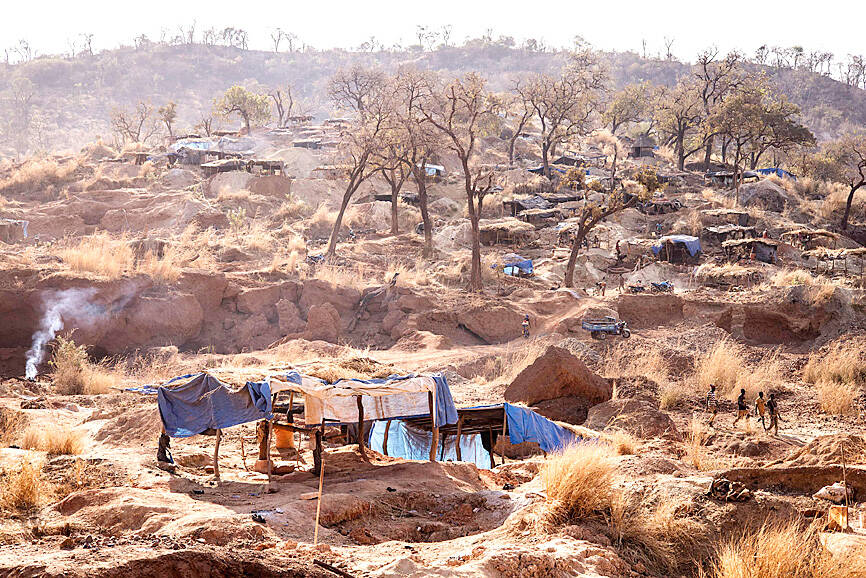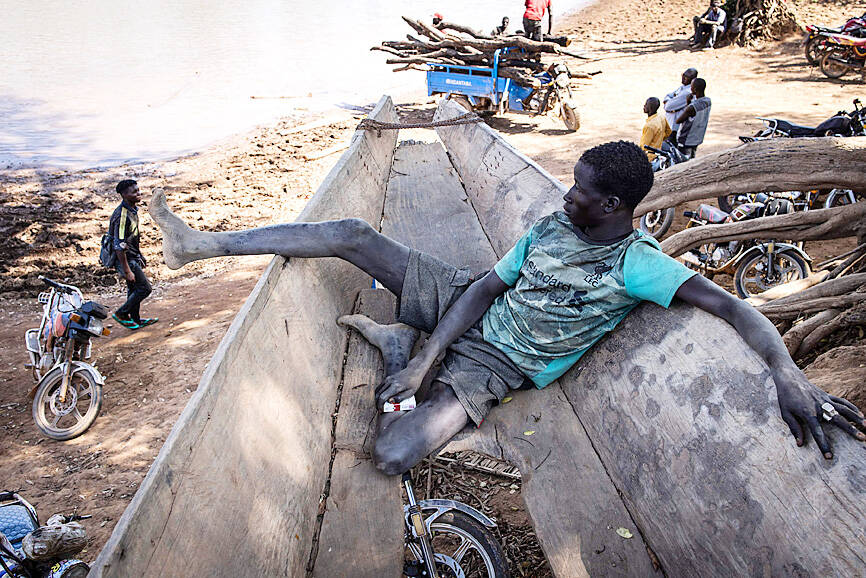Mohamed Bayoh climbed into the deep, pitch-black hole, hoping to emerge with a nugget that would change his life.
The 26-year-old Guinean is one of thousands of west Africans who have flocked to remote eastern Senegal in search of gold.
The rush for the precious metal has dramatically transformed Bantakokouta, a town on the borders of Mali and Guinea.

Photo: AFP
The locals numbered just a few dozen two decades ago, now there are several thousand on the back of a floating population of dream-seekers and risk-takers with gold in their eyes.
Their ant-like labor has left the landscape looking like a Swiss cheese.
As far as the eye can see, through the pervasive dusty mist, small huddled groups protected from the sun by makeshift branch shelters haul up spoil scratched from the ground.

Photo: AFP
Women sit nearby, sorting the rocks into two mounds — a big one for the discards and a much smaller one for the promising samples.
The same scenes are played out every day, with no guarantee of any success.
“Working here is like playing the lottery, you are never sure of winning,” said Bayoh, who added that he was nonetheless determined to stay put until he gets rich.
Other sites in the gold-rich region have been taken over by mining corporations, sometimes triggering land disputes with local people, but in Bantakokouta, informal mining has been allowed to carry on.
Diggers typically stay for a few months — sometimes just days — to chance their arm, hoping for a lucky strike that would enable them to send money home or start a business.
Bayoh was clear in his objective to “find a lot of gold.”
“Not a little ... a lot. To start another life in Guinea,” he added.
After six months’ grueling work, he had earned enough to buy two motorbikes.
One gram of gold — about the size of 60 grains of rice — brings in about 30,000 CFA francs (US$50).
However, the risks facing miners are many, from fatal falls, and cuts and landslips, to use of drugs to dull aches and pains, said Diba Keita, head of a community vigilance committee.
The town itself bears the signs of poverty and transience.
Its alleys are littered with garbage, and goats and sheep roam untended. The vast majority of the huts are rudimentary constructions made of bamboo and brushwood.
In his workshop, Souleymane Segda, a 20-year-old from Burkina Faso, put crushed pieces of promising-looking ore through a grinder.
The apparatus takes up most of his room, which has no toilet and doubles as his bedroom. The young man is covered in dirt as he sifts through the dust in search of flecks of gold.
The flakes are recovered after washing the dust with mercury — a practice that is banned because of its health and environmental risks, but which remains widespread.
“I can earn up to 50,000 CFA francs a day. I go back home as much as I can and when I’ll have earned enough, I will leave for good,” Segda said.
Bantakokouta has experienced a surge of activities familiar to gold rushes around the world — an influx of stores selling tools and electronic goods, places of worship, a medical post, nightclubs, video gaming rooms, and crime and vice.
“The gold has brought wealth. In the past, we used to go to Mako,” a town 20km away, said Waly Keita, 63.
He recalled with nostalgia the time when “our mums” used to dig in the river bed, searching for nuggets, while the men went into the bush to hunt and collect honey.
However, the gold rush has also brought problems, including “banditry” and “conflict,” Keita said.
The Senegalese and foreigners generally get on well in Bantakokouta, although flareups do occur.
In 2020 clashes between security forces and Guinean miners resulted in the death of two young men.
Senegalese authorities have also intensified operations to secure the border with Mali, fearing militants might cross it.
“Eastern Senegal would be a very interesting territory for jihadists, not necessarily for carrying out attacks, but for recruitment and funding,” a Western diplomat said. “The gold mining sites are ideal for finding frustrated young people who want to earn money, and gold is very easy to hide and trade.”

Ukraine’s military intelligence agency and the Pentagon on Monday said that some North Korean troops have been killed during combat against Ukrainian forces in Russia’s Kursk border region. Those are the first reported casualties since the US and Ukraine announced that North Korea had sent 10,000 to 12,000 troops to Russia to help it in the almost three-year war. Ukraine’s military intelligence agency said that about 30 North Korean troops were killed or wounded during a battle with the Ukrainian army at the weekend. The casualties occurred around three villages in Kursk, where Russia has for four months been trying to quash a

FREEDOM NO MORE: Today, protests in Macau are just a memory after Beijing launched measures over the past few years that chilled free speech A decade ago, the elegant cobblestone streets of Macau’s Tap Seac Square were jam-packed with people clamouring for change and government accountability — the high-water mark for the former Portuguese colony’s political awakening. Now as Macau prepares to mark the 25th anniversary of its handover to China tomorrow, the territory’s democracy movement is all but over and the protests of 2014 no more than a memory. “Macau’s civil society is relatively docile and obedient, that’s the truth,” said Au Kam-san (歐錦新), 67, a schoolteacher who became one of Macau’s longest-serving pro-democracy legislators. “But if that were totally true, we wouldn’t

ROYAL TARGET: After Prince Andrew lost much of his income due to his friendship with Jeffrey Epstein, he became vulnerable to foreign agents, an author said British lawmakers failed to act on advice to tighten security laws that could have prevented an alleged Chinese spy from targeting Britain’s Prince Andrew, a former attorney general has said. Dominic Grieve, a former lawmaker who chaired the British Parliament’s Intelligence and Security Committee (ISC) until 2019, said ministers were advised five years ago to introduce laws to criminalize foreign agents, but failed to do so. Similar laws exist in the US and Australia. “We remain without an important weapon in our armory,” Grieve said. “We asked for [this law] in the context of the Russia inquiry report” — which accused the government

TRUDEAU IN TROUBLE: US president-elect Donald Trump reacted to Chrystia Freeland’s departure, saying: ‘Her behavior was totally toxic, and not at all conducive to making deals Canadian Deputy Prime Minister Chrystia Freeland on Monday quit in a surprise move after disagreeing with Canadian Prime Minister Justin Trudeau over US president-elect Donald Trump’s tariff threats. The resignation of Freeland, 56, who also stepped down as finance minister, marked the first open dissent against Trudeau from within his Cabinet, and could threaten his hold on power. Liberal leader Trudeau lags 20 points in polls behind his main rival, Conservative Pierre Poilievre, who has tried three times since September to topple the government and force a snap election. “It’s not been an easy day,” Trudeau said at a fundraiser Monday evening, but